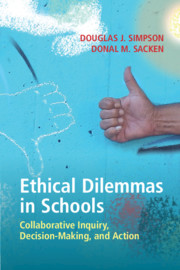Book contents
- Ethical Dilemmas in Schools
- Ethical Dilemmas in Schools
- Copyright page
- Contents
- Figures
- Foreword
- Preface
- Acknowledgments
- Chapter 1 What Can Educators Expect from Ethics?
- Chapter 2 What Does Sympathy or Empathy Have to Do with Ethics?
- Chapter 3 How Are Ethical Principles Useful?
- Chapter 4 What Does Regard for People Imply?
- Chapter 5 What Is a Problematic Ethical Situation?
- Chapter 6 What Are the Qualities of an Ethical Educator?
- Chapter 7 What Are the Characteristics of a Good School?
- Epilogue
- Appendix An Interview with Maria
- References
- Index
- References
Chapter 7 - What Are the Characteristics of a Good School?
Published online by Cambridge University Press: 18 December 2020
- Ethical Dilemmas in Schools
- Ethical Dilemmas in Schools
- Copyright page
- Contents
- Figures
- Foreword
- Preface
- Acknowledgments
- Chapter 1 What Can Educators Expect from Ethics?
- Chapter 2 What Does Sympathy or Empathy Have to Do with Ethics?
- Chapter 3 How Are Ethical Principles Useful?
- Chapter 4 What Does Regard for People Imply?
- Chapter 5 What Is a Problematic Ethical Situation?
- Chapter 6 What Are the Qualities of an Ethical Educator?
- Chapter 7 What Are the Characteristics of a Good School?
- Epilogue
- Appendix An Interview with Maria
- References
- Index
- References
Summary
Dewey encourages schools to become more than places where students learn basic and advanced skills, develop a range of creative and scientific abilities, engage in inquiry and dialogue, nourish desirable dispositions and habits, and, on occasions, listen to lectures and presentations. In addition, he nudges schools away from the belief that ethical education is a discrete part of the curriculum. Instead, he explains that ethical growth occurs daily at school. In ordinary activities, all students are encouraged to develop the “power to share effectively in social life” (MW 9, 370). Moreover, instead of urging schools to focus largely on students and educators as individuals, he encourages them to help everyone recognize that they are considerably more than an individual; they are a social being who should enjoy human interactions and responsibilities including: coteaching, cooperative learning, and, in the process, becoming a more conscious and contributing member of school and external groups.
Keywords
Information
- Type
- Chapter
- Information
- Ethical Dilemmas in SchoolsCollaborative Inquiry, Decision-Making, and Action, pp. 166 - 207Publisher: Cambridge University PressPrint publication year: 2020
